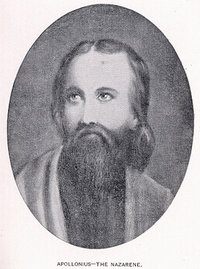



Apollonius of Tyana (13 March 2 - 98?) was a Neo-Pythagorean philosopher and teacher of Greek origin. His teaching influenced scientific thought for centuries after his death.
He is best known through the medium of the writer Philostratus, in whose biography some have seen an attempt to construct a rival to Jesus Christ. Apollonius was a vegetarian, and a disciple of Pythagoras. He is quoted as having said "For I discerned a certain sublimity in the discipline of Pythagoras, and how a certain secret wisdom enabled him to know, not only who he was himself, but also who he had been; and I saw that he approached the altars in purity, and suffered not his belly to be polluted by partaking of the flesh of animals; and that he kept his body pure of all garments woven of dead animal refuse; and that he was the first of mankind to restrain his tongue, inventing a discipline of silence described in the proverbial phrase, "An ox sits upon it."
I also saw that his philosophical system was in other respects oracular and true. So I ran to embrace his teachings..."He was born in the city of Tyana, in the Roman Empire province of Cappadocia in Asia Minor, a few years before the Christian era.
He was educated in the nearby city of Tarsus and in the temple of Asclepius at Aegae, where he devoted himself to the doctrines of Pythagoras and adopted the ascetic habit of life in its fullest sense.After keeping a vow of silence for five years, he trekked from Greece through Asia and visited Nineveh, Babylon and India, imbibing the oriental mysticism of magi, Brahmans and gymnosophists.
During this journey, and subsequent return, he attracted a scribe and disciple, Damis, who recorded events in the life of the philosopher. These notes described a number of events in the life of Apollonius, including events relating to a succession of emperors, as he lived 100 years.
Eventually the notes of Damis came into the possession of the empress Julia Domna wife of Severus, who commissioned Philostratus to use the notes to assemble a biography of the sage.
The narrative of his travels given by his disciple Damis and reproduced by Philostratus is so full of the miraculous that many have regarded him as an imaginary character. On his return to Europe he was saluted as a magician, and received the greatest reverence from priests and people generally.
He himself claimed only the power of foreseeing the future; yet in Rome it was said that he raised from death the daughter of a senator. In the halo of his mysterious power he passed through Greece, Italy and Spain. It was said that he was accused of treason both by Nero and by Domitian, but escaped by miraculous means. Finally he set up a school at Ephesus, where he died, apparently at the age of a hundred years.
Philostratus keeps up the mystery of his hero's life by saying, "Concerning the manner of his death, if he did die, the accounts are various."
The work of Philostratus, is generally regarded as a religious work of fiction. It contains a number of obviously fictitious stories, through which, however, it is not impossible to discern the general character of the man. In the 3rd century, Hierocles endeavored to prove that the doctrines and the life of Apollonius were more valuable than those of Christ, and, in modern times, Voltaire and Charles Blount (1654-1693), the English freethinker, have adopted a similar standpoint.
Apart from this extravagant eulogy, it is absurd to regard Apollonius merely as a vulgar charlatan and miracle-monger. If we cut away the mass of mere fiction which Philostratus accumulated, we have left a highly imaginative, earnest reformer who laboured to infuse into the flaccid dialectic of paganism a saner spirit of practical morality.
He wrote many books and treatises on a wide variety of subjects during his life, including science, medicine, and philosophy.
His scientific theories were ultimately applied to the earth-centered Ptolemaic idea that the sun revolved around the earth. A few decades after his death, the Emperor Hadrian collected his works and ensured their publication throughout his realm.
Some scholars, both ancient and contemporary, believe that Apollonius was actually the Christian Apostle Paul, as many of his teachings coincide with those of Paul, and Apollonius is said to have done many of the same things Paul did. Others suggest Apollonius was the Jesus Christ of the Christian scriptures.
Others, such as the 2nd-century wit Lucian, ascribed the false magic of "the notorious Apollonius", transmitted through a pupil, to the bag of impostures played by Alexander the false prophet, a contemporary travelling mage posing as a priest of Asclepius, ca 150 Ð 170.
Apollonius' fame was still evident in 272, when the Emperor Aurelian besieged Tyana, which had rebelled against Roman rule. In a dream or vision, Aurelian claimed to have seen Apollonius speak to him, beseeching him to spare the city of his birth. In part, Aurelian said Apollonius told him "Aurelian, if you desire to rule, abstain from the blood of the innocent! Aurelian, if you will conquer, be merciful!" Aurelian, who admired Apollonius, spared Tyana.
Medieval Islamic alchemist Jabir ibn Hayyan's Book of Stones is a lengthy analysis of alchemical works attributed to Apollonius (called "Balinas") (see e.g. Haq, which provides an English translation of much of the Book of Stone.